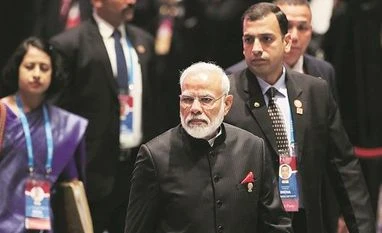Will resolve outstanding issues raised by India for not joining RCEP: China
China also said it would welcome India joining the deal at an early date
)
Prime Minister Narendra Modi on the sidelines of the Asean summit. Photo: Reuters
China said on Tuesday that it will follow the principle of "mutual understanding and accommodation" to resolve the outstanding issues raised by India for not joining the Beijing-backed mega Regional Comprehensive Economic Partnership (RCEP).
China also said it would welcome India joining the deal at an early date.
Prime Minister Narendra Modi on Monday conveyed India's decision not to join the RCEP deal at a summit meeting of the 16-nation bloc, effectively wrecking its aim to create the world's largest free trade area having half of the world's population.
"The present form of the RCEP Agreement does not fully reflect the basic spirt and the agreed guiding principles of the RCEP. It also does not address satisfactorily India's outstanding issues and concerns. In such a situation, it is not possible for India to join RCEP Agreement," Modi said.
India has been forcefully raising the issue of market access as well as protected lists of goods mainly to shield its domestic market as there have been fears that the country may be flooded with cheap Chinese agricultural and industrial products once it signs the deal.
Also Read
Asked for China's comments on India not joining the RCEP deal over concern of cheap Chinese products potentially harming its domestic industry, Chinese Foreign Ministry spokesman Geng Shuang told the media here on Tuesday that China welcomes India joining the deal.
"The RCEP is open. We will follow the principle of mutual understanding and accommodation to negotiate and resolve those outstanding problems raised by India and we welcome an early joining by India," he said.
He said the RCEP is a regional trade agreement and mutually beneficial in nature.
"If it is signed and put into implementation it is conducive for the Indian goods entry into China and other participating countries. In the same vein, it will also help Chinese goods to enter the markets of India and other participating countries," he said.
"This is two-way and complementary (deal) and I should point out that China and India are both emerging major developing countries. We have a huge market of 2.7 billion people and there is a big potential in the market," he said.
Geng said, "over the past five years' Chinese imports from India have been increased by 15 per cent. We do not deliberately pursue trade surplus against India. We can expand and increase our cooperation in investment, production capacity and tourism and make a bigger pie out of cooperation for sustainable and balanced development."
Asked whether India's decision not to sign the deal would dent the RCEP deal, Geng reiterated that China is willing to work with all parties on the principle of mutual understanding and accommodation and continue to solve the outstanding issues.
"We welcome India joining at an early date," he said and referred to the joint statement issued after the RCEP summit on Monday which stated "India has significant outstanding issues, which remain unresolved. All RCEP Participating Countries will work together to resolve these outstanding issues in a mutually satisfactory way. India's final decision will depend on satisfactory resolution of these issues".
Chinese President Xi Jinping also referred to the RCEP deal in his address on Tuesday at Shanghai while inaugurating the China International Import Expo but skirted India's decision to opt out of the deal.
"I am happy to note that yesterday, 15 countries taking part in the Regional Comprehensive Economic Partnership (RCEP) concluded text-based negotiations, and I hope the agreement will be signed and enter into force at an early date. China will be happy to conclude high-standard free trade agreements with more countries, Xi said.
The RCEP negotiations were launched by ASEAN (Association of Southeast Asian Nations) leaders and six other countries during the 21st ASEAN Summit in Phnom Penh in November 2012.
"India conveyed its decision at the summit not to join the RCEP agreement. This reflects both our assessment on the current global situation as well as fairness and balance of the agreement. India had significant issues of core interests that remained unresolved," Secretary (East) in the Ministry of External Affairs, Vijay Thakur Singh, told reporters in Bangkok on Monday.
The negotiations for the proposed free-trade agreement included 10 member countries of the ASEAN and six of the bloc's dialogue partners -- China, Japan, South Korea, India, Australia and New Zealand. (Ed the above paras from PTI story of Monday).
More From This Section
Don't miss the most important news and views of the day. Get them on our Telegram channel
First Published: Nov 05 2019 | 4:45 PM IST


